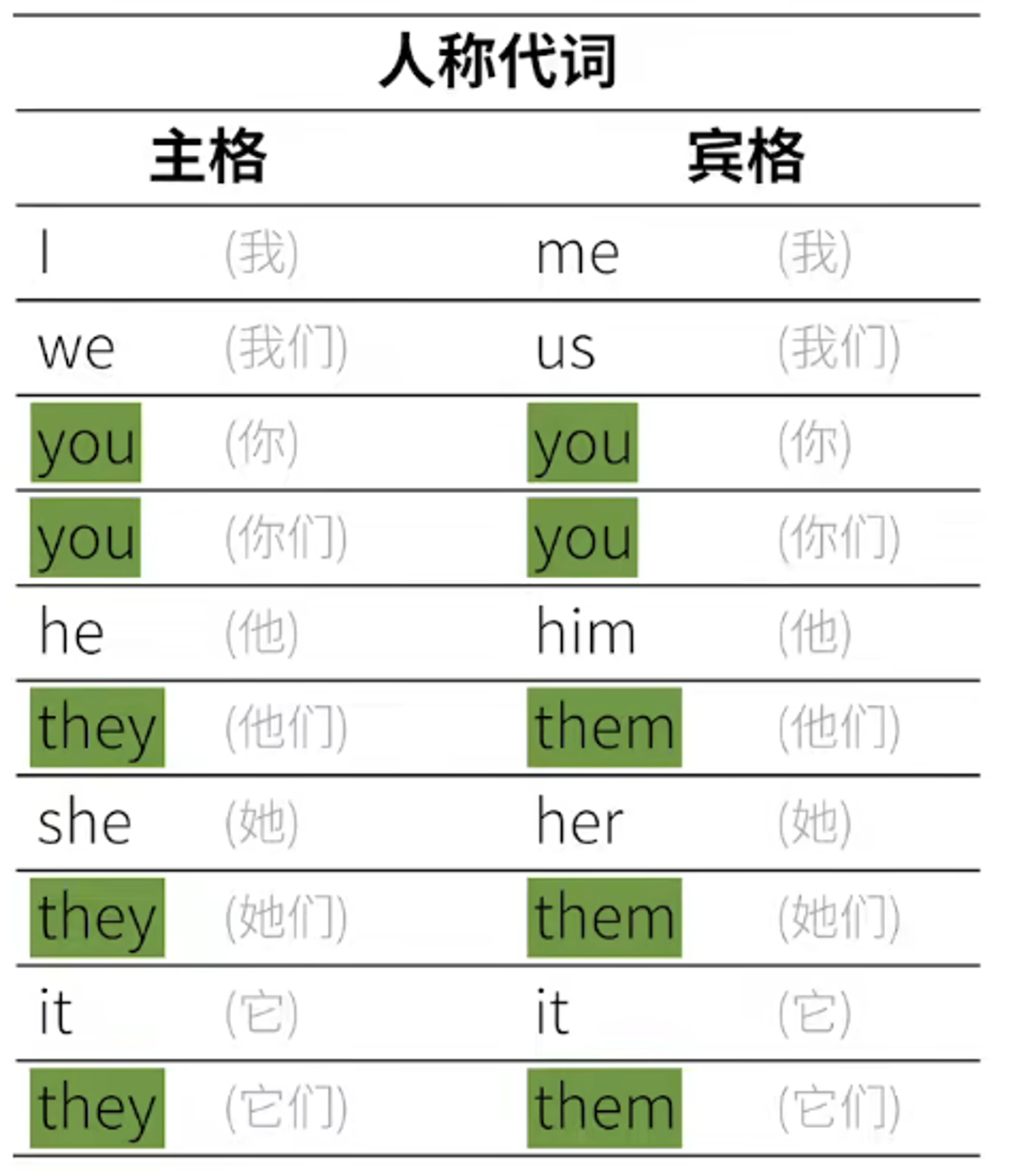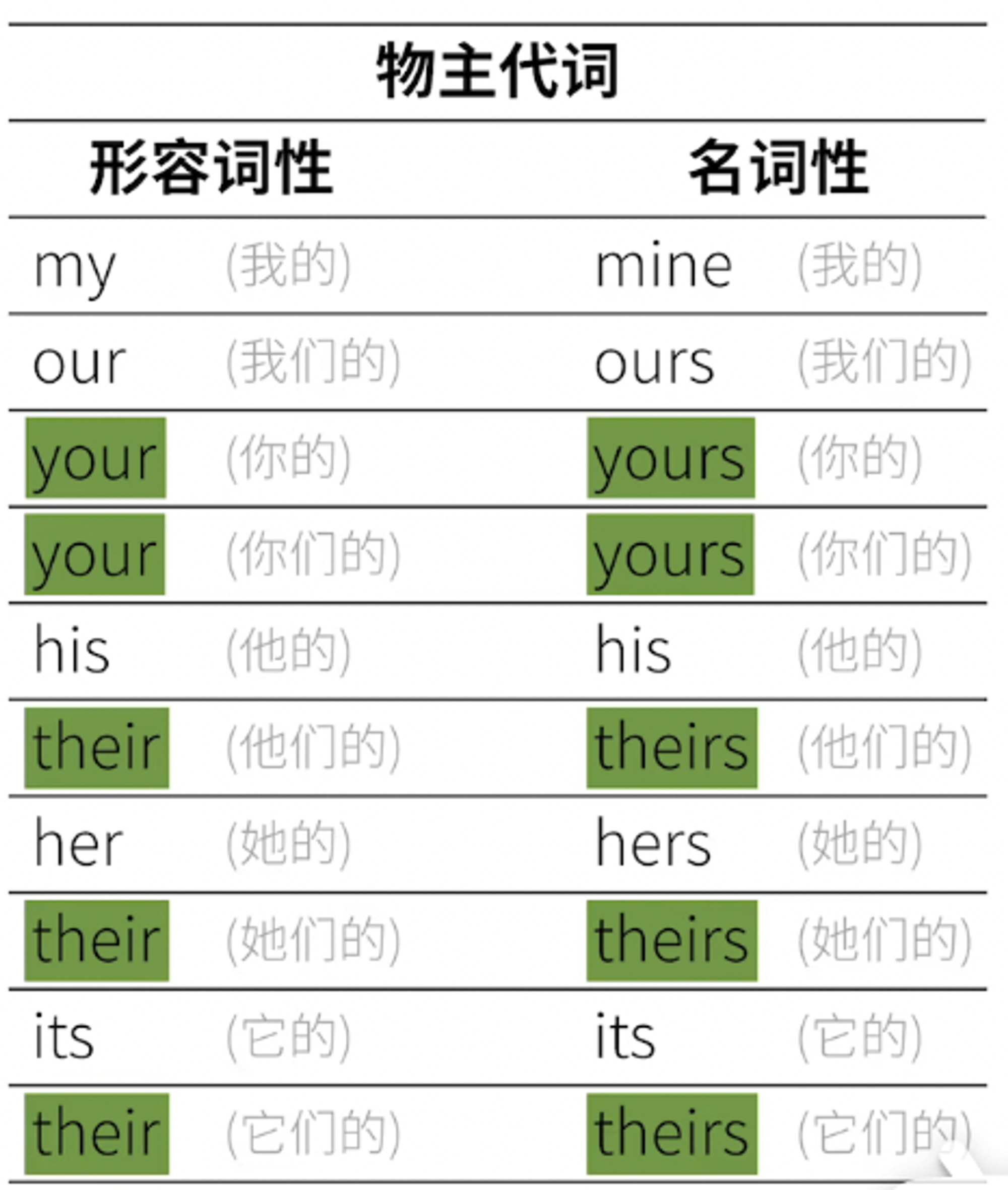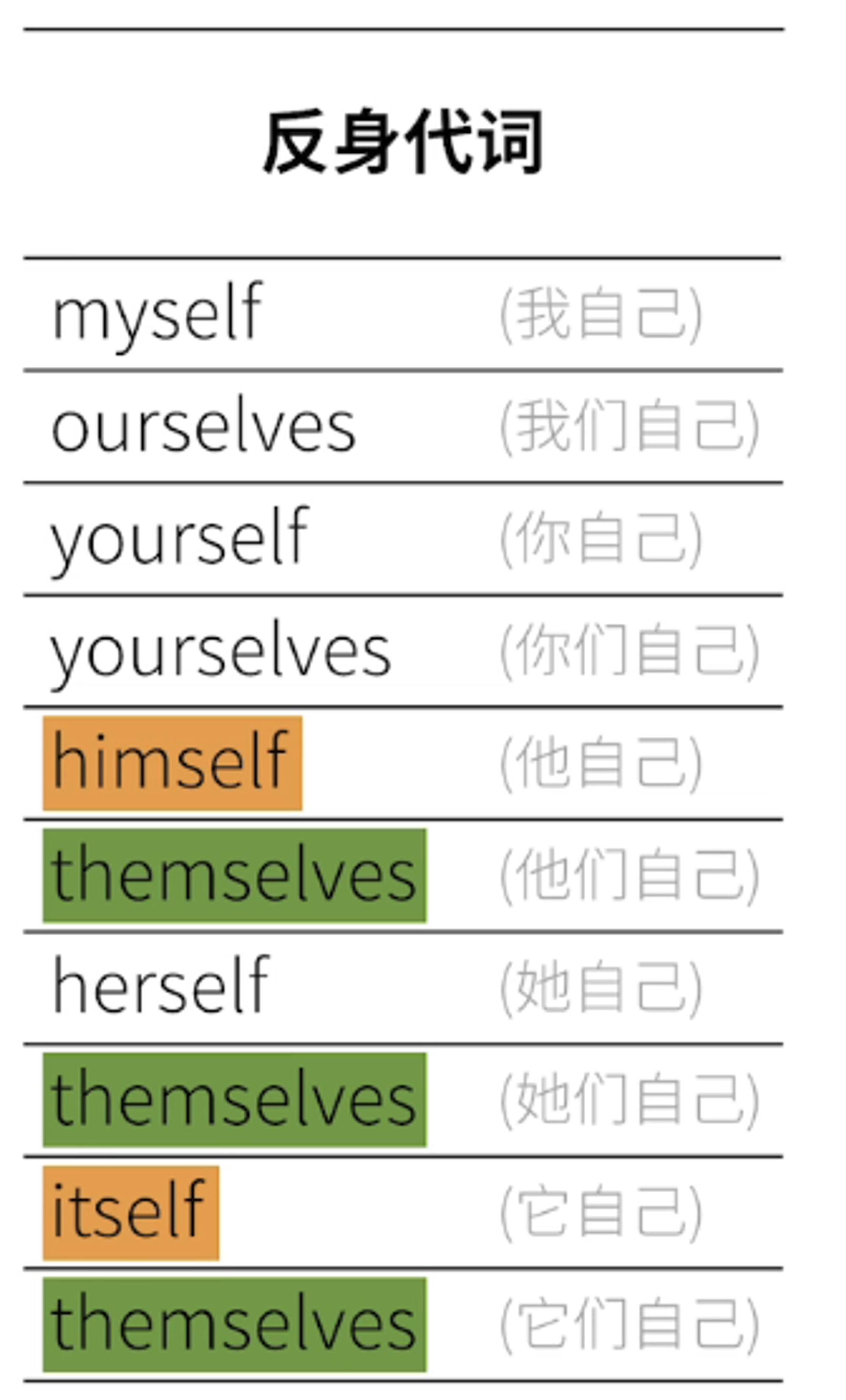英语十大词类——代词
type
Post
date
Jun 13, 2021
summary
代词是指代名词或一句话的一种词类。大多数代词具有名词和形容词的功能。英语中的代词,按其意义、特征及在句中的作用分为:人称代词、物主代词、指示代词等。
category
英语笔记
tags
英语
十大词类
password
URL
Property
Feb 28, 2024 01:09 PM
本文整理自B站【英语兔】的教学视频,感兴趣的朋友可以自行前往观看。
一、人称代词
1.1、人称代词的作用
- 相同的名词出现太多,为了防止重复
There is a rabbit. The rabbit is white. The rabbit is eating a carrot. The rabbit looks happy.
There is a rabbit. It is white. It is eating a carrot. It looks happy.
- 保持句子的完整性
- Who is he? Do you know?
- I don’t know. I thought you know him
1.2、人称代词的种类

1.3、人称代词的“格”(主格/宾格)
- 在中文中,人称代词的主宾格相同(不区分主宾格)
- 我看见了他,他也看见了我
- 在英语中,人称代词在句中所扮演的角色不同,那它对应的“格”也会做相应的变化
- I saw him. He also saw me
1.4、常见易错
- you and I(作主语)
- You and I saw him
- you and me(做宾语)
- He saw you and me
二、物主代词
2.1、物主代词的作用
- 物主代词主要是表达所属关系,”属格“
2.2、物主代词的种类

例句
It is my carrot. The carrot is mine.
三、反身代词
指代主体自身
常见反身代词

四、强调代词
强调代词的样子和反身代词相同,但是强调代词在句中一般表强调
The rabbit washed himself.(反身代词,作宾语)
The rabbit washed the carrots himself.(强调代词,作状语)兔子自己洗了胡萝不
The rabbit will do it himself.(强调代词,作状语)兔子将亲自去做它
五、相互代词
两者之间用:each other
三者及以上:one another
六、指示代词(这/那)
6.1、指示代词种类
- this 这(离说话人较近)
- these 这些
- that 那(离说话人较远)
- those 那些
6.2、指示代词作用
- 做代词
- 限定范围,后接名词
- this rabbit
七、不定代词
不确定的代表名词多少的词
7.1、不知道可数名词的数量:有几个,一些,个把
- many rabbits
- a few + 名词复数 (表肯定的意义:一些)
- few + 名词复数 (表否定的意义:几乎没有)
7.2、不知道不可数名词的数量:少许,一些,很多
- much water
- a little + 不可数名词 (表肯定的意义:一些)
- little + 不可数名词 (表否定的意义:几乎没有)
7.3、some/any 可以接可数/不可数名词
some
- 一般用在肯定句中
- The rabbit needs some carrots
- 但是在疑问句中需要得到对方肯定的回答时也可以用some
- Would you like some coffee?
any
- 一般用在否定句/疑问句中,表示“一些”
- Does the rabbit need any carrots?
- 当any表示“任何一个”时,也可以用在肯定句中
- The rabbit can eat any carrot
7.4、each/every
表示“每”,后接单数
- each carrot
- every carrot
each
- 可以做代词,单独作主语
- There are many carrots. Each is big.
- 表示两个/两个以上的每一个
- There are many carrots on each side of the street.
every
- 不可以单独做主语,后面需接名词
- 表示三个/三个以上的每一个
7.5、either/neither
- either/neither做主语时,谓语动词要用单数形式
either
- 两者中的每一个
- Give the rabbit this or that carrot. Either is good.
- Either of the carrots is good.
neither
- 两者中每一个都不
- Don’t give the rabbit this or that carrot. Neither is good.
- Neither of the carrots is good.
7.6、both/all
- both/all做主语时,谓语动词要用复数形式
both 两者都
Both of the rabbits are cute.
all 三者及以上都
All of the rabbits are cute.
7.7、other/the other/another
other 另外的,其他的(+名词)
- I like this carrot. I don’t like other carrots.
the other 特指两者中的另一个
- This carrot is bigger than the other carrot
another 泛指三个/三个以上中的另一个,不确定具体是哪一个
- The rabbit doesn’t like this carrot.Give him another carrot
7.8、one/it
- The rabbit doesn’t like this carrot.Give him another one.(这里的one是不定代词)
7.9、复合不定代词
every-
- everyone
- everybody
- everything
some-
- someone
- somebody
- something
any-
- anyone
- anybody
- anything
no-
- no one
- nobody
- nothing
例句
- Everyone is here
- The rabbit needs somthing to eat
- Nothing can stop the rabbit from eating carrots
形容词在修饰复合不定代词时需要后置
- The rabbit has somrthing important to do.
- The tabbit has nothing important to do.
八、疑问代词
对不知道的人或物提出问题,需要指代未知事物的代词,类似“什么”“谁”
1、who(主格)/whom(宾格)
- who:Who saw the rabbit?
- whom:
Whom did the rabbit see? 这里可以将whom换成who
但是当疑问代词做介词的宾语,后面紧跟介词就必须用whom
From whom did the rabbit get the carrots?
但是如果把from放在句尾,又可以用who(很少用)
2、what:What did the rabbit see?
3、which:Which is the best carrot?
4、whose:Whose is this carrot?
九、连接代词
9.1、作用:引导主语从句、宾语从句、表语从句
9.2、种类
- who:I don’t know who you are. 引导宾语从句
- whom
- whose
- what:What he side isn’t ture. 引导主语从句
- which:The important thing is which rabbit is smarter. 引导表语从句
- whoever ever表示任何、一切,加ever之后表示强调;下同
- whomever
- whatever:The rabbit wants to eat whatever he likes.
- whichever
十、关系代词
10.1、作用:定语从句专用
10.2、种类
- who:The rabbit who became hungry ate a carrot.
- whom:The rabbit whom I saw ate a carrot.
- whose:The rabbit whose ears are long ate a carrot
- which:The rabbit ate the carrot which/that I bought.
- that
- as:The rabbit ate the carrot, as wae expected.